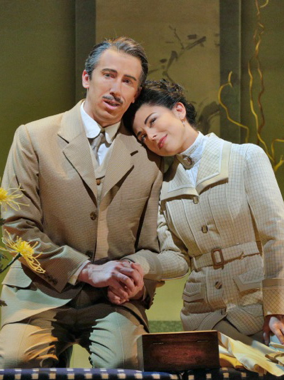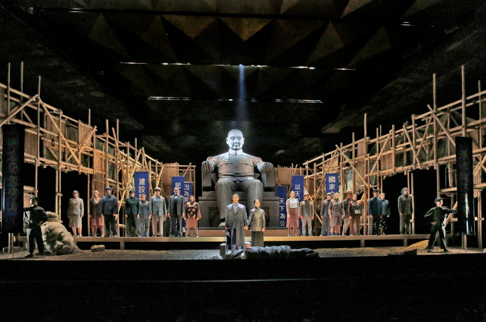Recently in Performances
English Touring Opera are delighted to announce a season of lyric monodramas to tour nationally from October to December. The season features music for solo singer and piano by Argento, Britten, Tippett and Shostakovich with a bold and inventive approach to making opera during social distancing.
This tenth of ten Live from London concerts was in fact a recorded live performance from California. It was no less enjoyable for that, and it was also uplifting to learn that this wasn’t in fact the ‘last’ LfL event that we will be able to enjoy, courtesy of VOCES8 and their fellow vocal ensembles (more below …).
Ever since Wigmore Hall announced their superb series of autumn concerts, all streamed live and available free of charge, I’d been looking forward to this song recital by Ian Bostridge and Imogen Cooper.
Although Stile Antico’s programme article for their Live from London recital introduced their selection from the many treasures of the English Renaissance in the context of the theological debates and upheavals of the Tudor and Elizabethan years, their performance was more evocative of private chamber music than of public liturgy.
Evidently, face masks don’t stifle appreciative “Bravo!”s. And, reducing audience numbers doesn’t lower the volume of such acclamations. For, the audience at Wigmore Hall gave soprano Elizabeth Llewellyn and pianist Simon Lepper a greatly deserved warm reception and hearty response following this lunchtime recital of late-Romantic song.
For this week’s Live from London vocal recital we moved from the home of VOCES8, St Anne and St Agnes in the City of London, to Kings Place, where The Sixteen - who have been associate artists at the venue for some time - presented a programme of music and words bound together by the theme of ‘reflection’.
'Such is your divine Disposation that both you excellently understand, and royally entertaine the Exercise of Musicke.’
‘And there was war in heaven: Michael and his angels fought against the dragon; and the dragon fought and his angels, And prevailed not; neither was their place found any more in heaven … that old serpent … Satan, which deceiveth the whole world: he was cast out into the earth, and his angels were cast out with him.’
There was never any doubt that the fifth of the twelve Met Stars Live in Concert broadcasts was going to be a palpably intense and vivid event, as well as a musically stunning and theatrically enervating experience.
‘Love’ was the theme for this Live from London performance by Apollo5. Given the complexity and diversity of that human emotion, and Apollo5’s reputation for versatility and diverse repertoire, ranging from Renaissance choral music to jazz, from contemporary classical works to popular song, it was no surprise that their programme spanned 500 years and several musical styles.
The Academy of St Martin in the Fields have titled their autumn series of eight concerts - which are taking place at 5pm and 7.30pm on two Saturdays each month at their home venue in Trafalgar Square, and being filmed for streaming the following Thursday - ‘re:connect’.
The London Symphony Orchestra opened their Autumn 2020 season with a homage to Oliver Knussen, who died at the age of 66 in July 2018. The programme traced a national musical lineage through the twentieth century, from Britten to Knussen, on to Mark-Anthony Turnage, and entwining the LSO and Rattle too.
With the Live from London digital vocal festival entering the second half of the series, the festival’s host, VOCES8, returned to their home at St Annes and St Agnes in the City of London to present a sequence of ‘Choral Dances’ - vocal music inspired by dance, embracing diverse genres from the Renaissance madrigal to swing jazz.
Just a few unison string wriggles from the opening of Mozart’s overture to Le nozze di Figaro are enough to make any opera-lover perch on the edge of their seat, in excited anticipation of the drama in music to come, so there could be no other curtain-raiser for this Gala Concert at the Royal Opera House, the latest instalment from ‘their House’ to ‘our houses’.
"Before the ending of the day, creator of all things, we pray that, with your accustomed mercy, you may watch over us."
The doors at The Metropolitan Opera will not open to live audiences until 2021 at the earliest, and the likelihood of normal operatic life resuming in cities around the world looks but a distant dream at present. But, while we may not be invited from our homes into the opera house for some time yet, with its free daily screenings of past productions and its pay-per-view Met Stars Live in Concert series, the Met continues to bring opera into our homes.
Music-making at this year’s Grange Festival Opera may have fallen silent in June and July, but the country house and extensive grounds of The Grange provided an ideal setting for a weekend of twelve specially conceived ‘promenade’ performances encompassing music and dance.
There’s a “slide of harmony” and “all the bones leave your body at that moment and you collapse to the floor, it’s so extraordinary.”
“Music for a while, shall all your cares beguile.”
The hum of bees rising from myriad scented blooms; gentle strains of birdsong; the cheerful chatter of picnickers beside a still lake; decorous thwacks of leather on willow; song and music floating through the warm evening air.
Performances

22 Aug 2014
Santa Fe Opera Presents Huang Ruo's Sun Yat-sen
By emphasizing the love between Sun Yat-sen and Soong Ching-ling, Ruo showed us the human side of this universally revered modern Chinese leader. Writer Lindsley Miyoshi has quoted the composer as saying that the opera is “about four kinds of love.” It speaks of affection between friends, between parents and children, between lovers, and between patriots and their country.
Huang Ruo’s opera, Sun Yat-sen, depicts a seminal period in Chinese history. The opera contains both romance and documented history. Sun was a charismatic leader who tried to unify China and bring it into the modern world. Since his first wife, Lu Mu-zhen, had the traditional bound feet of an upper class bride, she was not able to keep up with Sun’s travels and many political appearances. Eventually, he found a more suitable companion in Soong Ching-ling.
Act I shows Ching-ling’s parents, Charlie Soong and Ni Gui-zhen, collecting money for Sun’s Revolutionary Alliance. Soon after Sun arrives, a messenger tells Charlie that there is a price on the leader’s head. During that visit Sun falls in love with Ching-ling, however, and their union will eventually become a part of history. In Act II they marry while exiled in Japan, after the self-sacrificing Mu-zhen grants him a divorce. Act III shows the couple’s return to China where the political strife continues. One terrible night Ching-ling miscarries while she and Sun are trying to escape from assassins. The finale of the opera shows a huge statue of the iconic leader, Sun Yat-Sen, and indicates his place in history.
By emphasizing the love between Sun and his second wife, Ruo showed us the human side of this universally revered modern Chinese leader. Also an important figure in modern Chinese history, Soong Ching-ling was vice-president of the People's Republic of China until she died in 1981. Writer Lindsley Miyoshi has quoted the composer as saying that the opera is “about four kinds of love.” It speaks of affection between friends, between parents and children, between lovers, and between patriots and their country.
 Joseph Dennis as Sun Yat-sen and Corinne Winters as Soong Ching-ling
Joseph Dennis as Sun Yat-sen and Corinne Winters as Soong Ching-ling
Although Chinese censors passed the opera, planned performances were eventually cancelled. Chinese tenor, Warren Mok, cancelled his Santa Fe appearances saying he had to return to Asia. Thus, American apprentice tenor Joseph Dennis found himself interpreting the title role with less than two weeks’ notice. A genuine trouper, he passed this trial by fire magnificently with high notes of gleaming bronze. The rest of the cast of was equally fine. Corinne Winters, especially, was an impressive Ching-ling. Winters is a graceful singer and an outstanding actress on the opera stage. Her lament in Act III, Scene 1 was profoundly moving.
Dong-Jian Gong was a most believable Charlie. MaryAnn McCormick sang the role of his wife with a glowing, warm mezzo. Chen-Ye Yuan and Katherine Carroll as Mr. and Mrs. Umeya made their characters come to life. Rebecca Witty was vocally and histrionically impressive as Sun’s first wife. It will be interesting to see her in a larger part.
Director James Robinson created a realistic atmosphere and decorated it with stylized dances by Seàn Curran. Allen Moyer’s practical bamboo sets indicated the constant construction of the new government. It culminated in the appearance of a giant figure of the immortal leader. Conductor Carolyn Kuan led the excellent Santa Fe Opera Orchestra in an eloquent rendition of Ruo’s wonderfully well-orchestrated score. Ruo's Chinese instruments gave the work its driving rhythms while his distinctive lyricism and affecting vocal writing produced its more romantic moments.
Maria Nockin
Cast and production information:
Sun Yat-sen, Joseph Dennis; Soong Ching-ling, Corinne Winters; Charlie Soong, Gong Dong-jian; Ni Gui-zhen, MaryAnn McCormick; Mr. Umeya, Chen Ye-yuan; Mrs. Umeya, Katherine Carroll; Lu Mu-zhen, Rebecca Witty; Assassins, Yoni Rose, Patrick Guetti; Dancers, Hiroki Ichinose; Stanton Jacinto; Kerry Kim; Scott Weber; Stacey Yuen; Conductor, Carolyn Kuan; Director, James Robinson; Scenic Design, Allen Moyer; Costume Design, James Schuette; Lighting Design, Christopher Akerlind; Choreography, Seàn Curran; Choir Master, Susanne Sheston.

